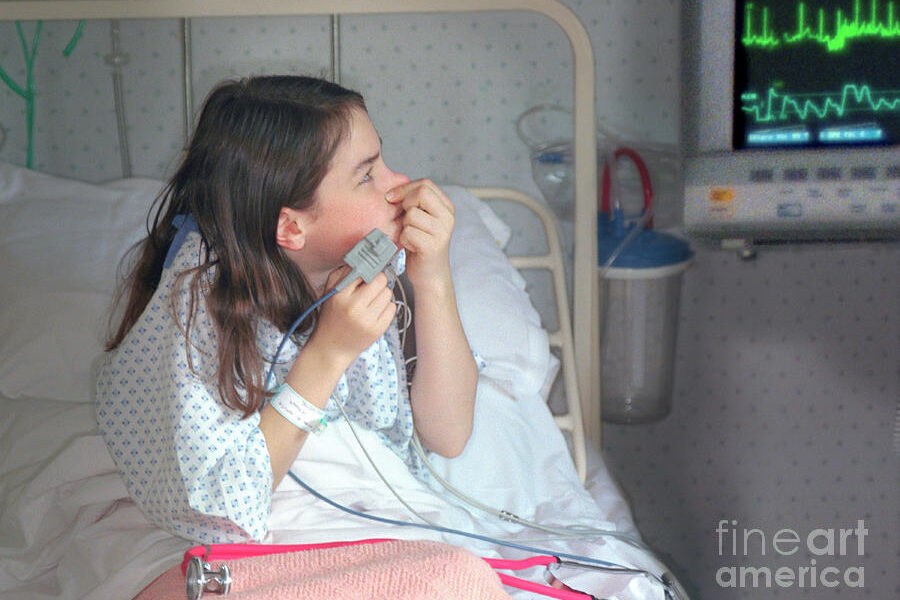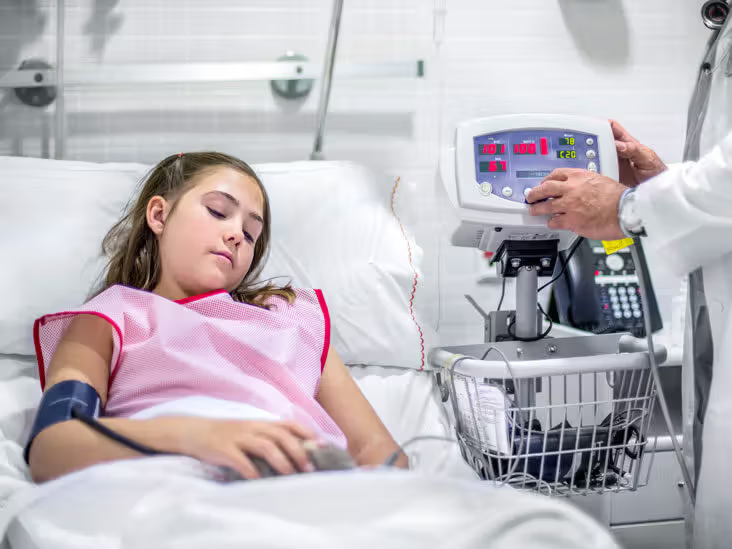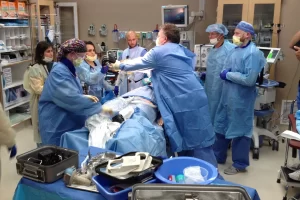Table of Contents
The Office for Students with Disabilities and My NJ Tube
My childhood was a rough ride. More of it was spent in the hospital than out. When it came time for college I had barely spent any time in high school, I had no idea what to expect. I was a shoo-in for the office for students with disabilities.
Before that, I had never really thought of myself as disabled, despite everything wrong with me. I had an NJ tube coming out of my nose to feed me where I couldn’t feed myself because of my gastroparesis. It went down my throat, past my esophagus, past my stomach, into the middle of my small intestine where it dripped in a tablespoon and a half of formula every hour. I had to carry around a backpack with my bag of tube feed, a bag of Pedialyte to deliver a 20 ml dose of electrolytes and hydration every hour, and a pump that controlled the rate of both bags. The tubing that came out my nose connected to the pump and tube feed bags by a hole in the bottom of the bag.
I also had issues maintaining a normal potassium level. The liquid potassium didn’t help, it just made me vomit, even when we put it through my NJ tube, so five days a week I had to go to an infusion center. For four hours I would sit there, typing away on my laptop as IV potassium dripped into my veins. My veins tended to coillapse and then they would have to find new sites for them. The potassium burned like acid as it dripped in.

Trouble Staying Out of The Hospital
Not only did I have a hard time maintaining a normal potassium level, heart rate and rhythm, I also had blood pressure issues. Originally my blood pressure was too low and I would pass out all the time, turn blue, and go into hypovolemic shock, then all the sudden out of the blue my blood pressure problems reversed and the numbers shot up to the 200s over 100s. I also ended up in the hospital due to frequent infections that my shot immune system couldn’t fight off as well as electrolyte imbalances and dehydration from being too nauseous to put enough water through my NJ tube.
My breathing began to become labored as well. Dr. Kaye ordered a chest X-ray and it came back showing that my alveoli were collapsed. Your alveoli are the little air sacs at the bottom of your lungs responsible for exchanging carbon dioxide and oxygen. She called it atelectasis and ordered a large oxygen tank that she called an “E-tank” with enough oxygen for 24 hours.
“You can use it if you start to feel too short of breath,” she told me, “Just let me know if you run out or if it loses too much air, and then I will replace it.

The Office for Students with Disabilities and Three Major Milestones
I was followed by an adolescent medicine doctor, a kidney doctor, a cardiologist, a pulmonologist, a gastroenterologist, a neurologist, an infectious disease doctor, a psychiatrist, and a therapist. It was a couple of days before my one-month follow-up with Dr. Green, the nephrologist, but on July 2nd I was celebrating my nineteenth birthday and I was also celebrating my graduation from high school and the end of my first year at Holyoke Community College. Thanks to the office for students with disabilities I was actually succeeding at college despite all my health issues and psychiatric issues. It was a celebration of three major milestones in my life on one partied up day.
The office for students with disabilities had recommended that I get my last few high school credits by taking college classes. That way they would count as both high school and college credits. This seemed like a great idea to me. I wasn’t really sure what I wanted to do with my life, but loved school and was practically drooling over all the classes they offered.

The Success of “When One Door Closes”
So far I had taken the CLEP tests for English 10 and 102 because those two classes seemed so basic and boring. I had already published a novel, “When One Door Closes” which had been a finalist in the Amazon Breakthrough Award competition the previous year.
They took the first 10,000 people that signed up. Then sifted through the manuscripts with Publishers Weekly to narrow them down to 500. Publishers Weekly wrote a review on each one. They wrote a glowing review on mine. They used consumer opinion to go down to the top 100 finalists out of the original 10,000. Then they called in Penguin Publishing who selected the top 20. Amazon paid Createspace to publish the top 20. Since then I have sold thousands of copies on Amazon. The winner got a deal with Penguin.

Loving College Classes
I figured that if my writing skills were enough to publish a book and make the top 20 in a contest with 10,000 applicants then I could bale out on English 101 and 102 at a small community college where I would have the resources of the office for students with disability in place.
Sure enough, the tests were a breeze and I had no issue getting the 12 credits in two hours. Then I excitedly signed up for creative writing.
Other classes I had taken earlier in the year were Intro to Psychology, intro to Sociology, Biology, Child Psychology, and Calculus.
The courses left me sitting at the edge of my seat, ears tuned into only the professors, pen scratching away taking copious notes, with all thoughts of childhood bullying left behind.

Accommodations by the Office for Students with Disabilities
The office for students with disabilities gave me a recorder to record lectures in case I started having symptoms and got distracted. They also assigned me a note taker in case I had to miss classes for hospitalizations or appointments. When I was hospitalized the professors were obligated to provide make-up work for me. I could also test separately and untimed to compensate for chronic pain distractions.
Last summer when I turned eighteen and was trying to figure out how to sign up for college, my mom reached out to the board of education to see the steps to get my high school diploma.
The “Disabled” Label
The board of education and the state had suggested to my mom that I get hooked up with an agency in Massachusetts (the state we lived in) called MassRehab. It was an organization to help people with disabilities achieve meaningful careers. Despite the fact that I knew I had gastroparesis, PTSD, and a developmental age of eight, I didn’t like using that “disabled” word on myself.

My Mom Wrote Up My High School Transcripts
I met with a woman named Susan several weeks after my eighteenth birthday. We had explained to them that I was still technically in high school, but wanted to finish up my credits in community college. They went over the high school transcripts my mom had made up of everything my parents and tutors had taught me and immediately agreed that they would be able to meet with me and see what they could do to help me out.
Settling into my Safety Net
Susan told my mom what paperwork to bring with us to our upcoming appointment and what to mail ahead. I let my mom be my safety net, knowing in the back of my mind that some good guys might be speared in the process. Still, I figured no medical issues were being discussed, and my mom was beyond helpful in figuring out the best situations for my education. As far as educators went, both my parents were on the highest, most skilled tier, that there exists with PhDs and Masters degrees. So, I snuggled into my safety net and let my mom take the reigns.

Qualifying for SSI and Medicaid
At the appointment with MassRehab Susan had all of the information that my mom had supplied in a big thick file in front of her. She kept repeating how smart I was and how impressed she was with me.
“However, I think one of the first things you’ll need to do, to get the most help from our agency, and the most monetary compensation for your education and job training, is to get on social security income (SSI) and MassHealth (Medicaid). You should have no trouble getting on SSI. With all of your medical and psychiatric needs, I’ll eat my file cabinet if you don’t get it on your first try!”

Too Disabled for the Real World
I didn’t know much about SSI or MassHealth, but it did bother me a little that she thought I would get on it so easily. I did know social security was for people who were either too old or too disabled to work and I knew I certainly wasn’t too old and didn’t feel too good about falling so easily into a category of people who were too disabled to work.
Mental Illness Doesn’t Innoculate You Against Medical Issues
Plus, she had mentioned psychiatric issues, and my skin had tingled in a familiar dance. Somehow, I knew my mom had been at it again. Yes, I knew I did have psychiatric issues, I had an anxiety disorder, I had major depression, sometimes I hallucinated, but I didn’t want my dirty laundry aired all over the place. My psychiatric symptoms embarrassed me, but they had no effect on my medical conditions. The problem was, once you got diagnosed with a psychiatric condition a lot of medical personnel automatically assumed that you could have no medical issues whatsoever, everything had to be caused by the mental health issues. It’s almost like they assume somehow mental illness inoculates you against physical illness.
PTSD From a Psych Unit
I’d also had a lot of trauma in my life that had caused PTSD
My PTSD was not from the physical or sexual abuse, it was from the psych unit I had been on at age ten. I had been repeatedly vomiting from the gastroparesis itself and the bowel obstruction that I had developed that hadn’t been caught for days and days. Every time I had an episode of vomiting, I had privileges and ‘points’ and ‘levels’ taken away and was chastised for purging and sent to my room as if I could control it.

Suicide Precautions and Other Lies Psych Nurses Tell
Also, sometimes when I threw up, the tube would get thrown up and it would come curling up and out my mouth and they would tell me I was at risk for choking on tube feed and dying. they would then decide to put me on suicide precautions, take away my shoelaces, make me wear a hospital gown, take away all my toys, make me sleep in the Quiet Room (seclusion room), and not be allowed to be more than an arm’s length away from staff.
Other times I threw up the whole tube and I would be told I pulled it out and they would tell me they had seen me do it, even though I knew I had just thrown it up. No one would believe me when I explained the truth, they would just listen to the nurses and aides who swore up and down that they’d seen me yank it out.
Bowel Obstruction and Emergency Surgery
The psych unit had also given me PTSD symptoms when they told me that I wasn’t in pain and that if I kept lying about being in pain no one would ever believe me. I was told this the day before I was found to have 2.5 inches of necrotic dead bowel in my belly and had to be rushed into emergency surgery.

Plenty of Reasons to Work With the Office for Students with Disabilities
All of my doctors, even the good ones who knew I had severe medical issues also knew I had psychiatric disorders.
I did have anxiety, depression, and Complex PTSD, but according to my parents, that was the extent of my health issues. At least my good doctors understood that I had irrefutable test results showing that I also had gastroparesis, and some type of dysautonomia, they just weren’t sure what kind.
“You’re going to need to get doctor’s notes and hospital records from the present day going all the way back ten years.” Susan explained. “You also need all her school records. They may request more information once we give them the initial reports or they may ask for me to be evaluated by someone from their department. She also said that there was a chance I’d get denied and that we’d have to appeal or get a lawyer, but she thought that was, “highly unlikely given “how severely disabled you are.”

Getting Approved for SSI and Medicaid on the First Try With No Lawyer
Once again that statement made me squirm. As I said before, I knew I was sick. I knew I had to miss a lot of school for being sick. I knew I was in the hospital a lot. I knew I had a lot of doctors. I knew I had extra medical gadgets. I knew I’d been homeschooled because I’d been too sick to go to school, but I’d never actually applied the term disabled to myself.
Something about the term “disabled” seemed so permanent. I’d always thought in a few more years I’d get better. My parents had always reinforced that view, yet here I was, eight years later, on the cusp of adulthood, sicker than ever and being told I was so disabled that I’d get accepted for SSI and state Medicaid on the first try with no lawyer.
Later on, in life, my parents would tell me that the only reason I didn’t get SSI and Medicaid sooner (before I was eighteen), was because my parent’s income had made me ineligible. Their combined income of way over six figures was way too much for me to qualify for SSI while being their dependent.

Coming Up With My Nursing Goal with the Office for Students with Disabilities
Sure enough, just as Susan as she had suggested, I was approved immediately for SSI and Medicaid. I wasn’t sure if that was something one celebrates or frowns on, but I liked the idea of getting some spending money each month, although a good portion of it went to my dad as my rep-payee. He took it to take care of me and pay for my medical bills and clothes and the small amounts of food and drink that I could actually take in by mouth.
Once I had gotten on the necessary programs MassRehab had explained how they would help me come up with a career goal and then ways to meet my goal.
After that, I enrolled in Holyoke Community College for my last year of high school with the goal of a career in nursing and getting a liberal arts degree from HCC (Holyoke Community College) before transferring to a four-year college to complete my BSN in nursing. MassRehab was paying for all of my nine credits a semester at that point, as well as all of my books, and they had helped me get hooked up with Erin, that woman from the office for students with disabilities.

What Does Disabled Feel Like?
I still didn’t feel disabled though. Yes, I had a tube going into me providing all my nutrition, hydration, and medication. Yes, I was on more meds than most eighty-year-olds and probably had the equal life span of most eighty-year-olds as well. Yes, with my prolonged QT I was at risk of dropping dead of a heart attack at any moment. But what did disabled feel like?

It was harder for me to move around for sure, my 80-pound body always felt so heavy, is that what disabled felt like? Maybe I didn’t want to know what being disabled felt like, maybe I wanted to keep pretending that I was just as normal as everyone else. Maybe if you pretended that you weren’t disabled then you really weren’t disabled. Maybe it was a frame-of-mind thing. It had been a struggle to set my life up in the right direction, but now, on July 2nd, the celebrations were hardy.
Discover more from chronicallyalive.org
Subscribe to get the latest posts sent to your email.





